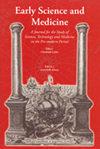Characterisations in Britain of Isaac Newton’s Approach to Physical Inquiry in the Principia between 1687 and 1713
IF 0.2
2区 哲学
Q3 HISTORY & PHILOSOPHY OF SCIENCE
引用次数: 0
Abstract
In order to gain a better understanding of the impact and circulation of the first edition of the Principia, we offer an analysis of public perceptions in Britain of Isaac Newton’s approach to physical inquiry in the Principia between the appearance of its first and second editions, in 1687 and 1713, respectively. We treat Newton’s readers as actors with distinctive scholarly backgrounds and interests rather than as followers or popularisers of a “Newtonian philosophy,” a label we find to be largely absent in the historical record before 1713, when it was purposefully used by Roger Cotes in his preface to the second edition of the Principia. Through our survey, we gain considerable insight into how Newton’s readers characterised the Principia and its author. We establish that British readers of the first edition of the Principia ascribed a relatively stable and interrelated number of characteristics to Newton’s natural philosophical approach, although different readers emphasised different things. We also show that the most detailed accounts of Newton’s natural philosophical approach were, not surprisingly, given in polemical contexts. We find that it is only at the very end of this period, and in polemical contexts, that the notion of a “Newtonian philosophy” with a specific and pathbreaking approach to physical inquiry arose.1687年至1713年间艾萨克·牛顿《原理》物理探究方法在英国的特点
为了更好地理解《原理》第一版的影响和发行量,我们分别在1687年第一版和1713年第二版出现期间,对英国公众对艾萨克·牛顿在《原理》中所采用的物理研究方法的看法进行了分析。我们将牛顿的读者视为具有独特学术背景和兴趣的演员,而不是“牛顿哲学”的追随者或普及者。我们发现,在1713年之前的历史记录中,“牛顿哲学”这个标签基本上是不存在的,当时罗杰·柯茨(Roger Cotes)在《原理》第二版的序言中有意使用了这个标签。通过我们的调查,我们对牛顿的读者如何描述《原理》及其作者有了相当深入的了解。我们发现,第一版《原理》的英国读者认为牛顿的自然哲学方法具有一些相对稳定且相互关联的特征,尽管不同的读者强调的东西不同。我们还表明,牛顿的自然哲学方法的最详细的叙述,毫不奇怪,是在论战的背景下给出的。我们发现,只有在这一时期的最后阶段,在争论的背景下,“牛顿哲学”的概念才以一种特定的、开创性的方式出现在物理研究中。
本文章由计算机程序翻译,如有差异,请以英文原文为准。
求助全文
约1分钟内获得全文
求助全文
来源期刊

Early Science and Medicine
HISTORY & PHILOSOPHY OF SCIENCE-
CiteScore
0.50
自引率
0.00%
发文量
22
审稿时长
>12 weeks
期刊介绍:
Early Science and Medicine (ESM) is a peer-reviewed international journal dedicated to the history of science, medicine and technology from the earliest times through to the end of the eighteenth century. The need to treat in a single journal all aspects of scientific activity and thought to the eighteenth century is due to two factors: to the continued importance of ancient sources throughout the Middle Ages and the early modern period, and to the comparably low degree of specialization and the high degree of disciplinary interdependence characterizing the period before the professionalization of science.
 求助内容:
求助内容: 应助结果提醒方式:
应助结果提醒方式:


